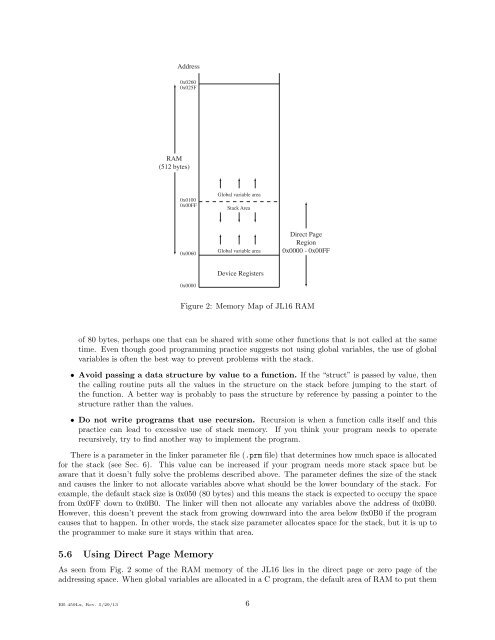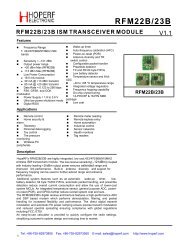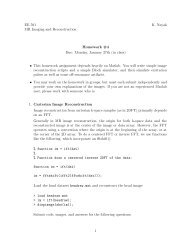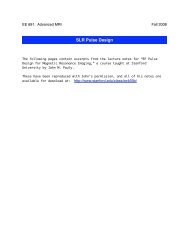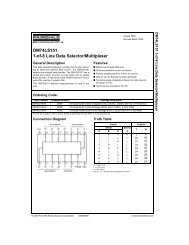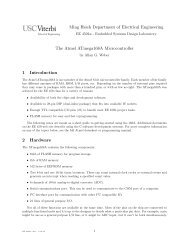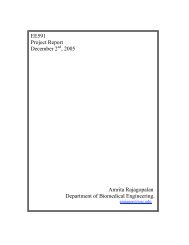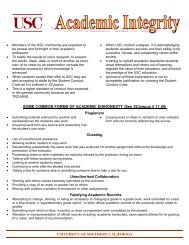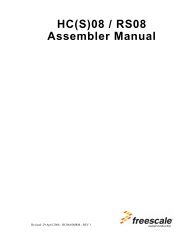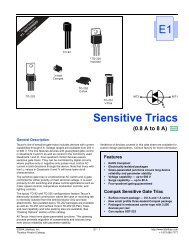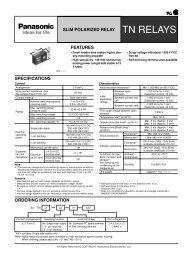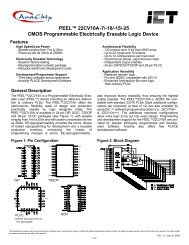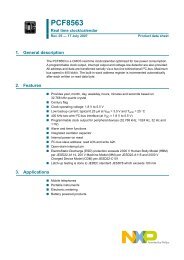Ming Hsieh Department of Electrical Engineering Programming the ...
Ming Hsieh Department of Electrical Engineering Programming the ...
Ming Hsieh Department of Electrical Engineering Programming the ...
You also want an ePaper? Increase the reach of your titles
YUMPU automatically turns print PDFs into web optimized ePapers that Google loves.
Address<br />
0x0260<br />
0x025F<br />
RAM<br />
(512 bytes)<br />
0x0100<br />
0x00FF<br />
0x0060<br />
0x0000<br />
Global variable area<br />
Stack Area<br />
Global variable area<br />
Device Registers<br />
Direct Page<br />
Region<br />
0x0000 - 0x00FF<br />
Figure 2: Memory Map <strong>of</strong> JL16 RAM<br />
<strong>of</strong> 80 bytes, perhaps one that can be shared with some o<strong>the</strong>r functions that is not called at <strong>the</strong> same<br />
time. Even though good programming practice suggests not using global variables, <strong>the</strong> use <strong>of</strong> global<br />
variables is <strong>of</strong>ten <strong>the</strong> best way to prevent problems with <strong>the</strong> stack.<br />
• Avoid passing a data structure by value to a function. If <strong>the</strong> “struct” is passed by value, <strong>the</strong>n<br />
<strong>the</strong> calling routine puts all <strong>the</strong> values in <strong>the</strong> structure on <strong>the</strong> stack before jumping to <strong>the</strong> start <strong>of</strong><br />
<strong>the</strong> function. A better way is probably to pass <strong>the</strong> structure by reference by passing a pointer to <strong>the</strong><br />
structure ra<strong>the</strong>r than <strong>the</strong> values.<br />
• Do not write programs that use recursion. Recursion is when a function calls itself and this<br />
practice can lead to excessive use <strong>of</strong> stack memory. If you think your program needs to operate<br />
recursively, try to find ano<strong>the</strong>r way to implement <strong>the</strong> program.<br />
There is a parameter in <strong>the</strong> linker parameter file (.prm file) that determines how much space is allocated<br />
for <strong>the</strong> stack (see Sec. 6). This value can be increased if your program needs more stack space but be<br />
aware that it doesn’t fully solve <strong>the</strong> problems described above. The parameter defines <strong>the</strong> size <strong>of</strong> <strong>the</strong> stack<br />
and causes <strong>the</strong> linker to not allocate variables above what should be <strong>the</strong> lower boundary <strong>of</strong> <strong>the</strong> stack. For<br />
example, <strong>the</strong> default stack size is 0x050 (80 bytes) and this means <strong>the</strong> stack is expected to occupy <strong>the</strong> space<br />
from 0x0FF down to 0x0B0. The linker will <strong>the</strong>n not allocate any variables above <strong>the</strong> address <strong>of</strong> 0x0B0.<br />
However, this doesn’t prevent <strong>the</strong> stack from growing downward into <strong>the</strong> area below 0x0B0 if <strong>the</strong> program<br />
causes that to happen. In o<strong>the</strong>r words, <strong>the</strong> stack size parameter allocates space for <strong>the</strong> stack, but it is up to<br />
<strong>the</strong> programmer to make sure it stays within that area.<br />
5.6 Using Direct Page Memory<br />
As seen from Fig. 2 some <strong>of</strong> <strong>the</strong> RAM memory <strong>of</strong> <strong>the</strong> JL16 lies in <strong>the</strong> direct page or zero page <strong>of</strong> <strong>the</strong><br />
addressing space. When global variables are allocated in a C program, <strong>the</strong> default area <strong>of</strong> RAM to put <strong>the</strong>m<br />
EE 459Lx, Rev. 5/29/13 6


